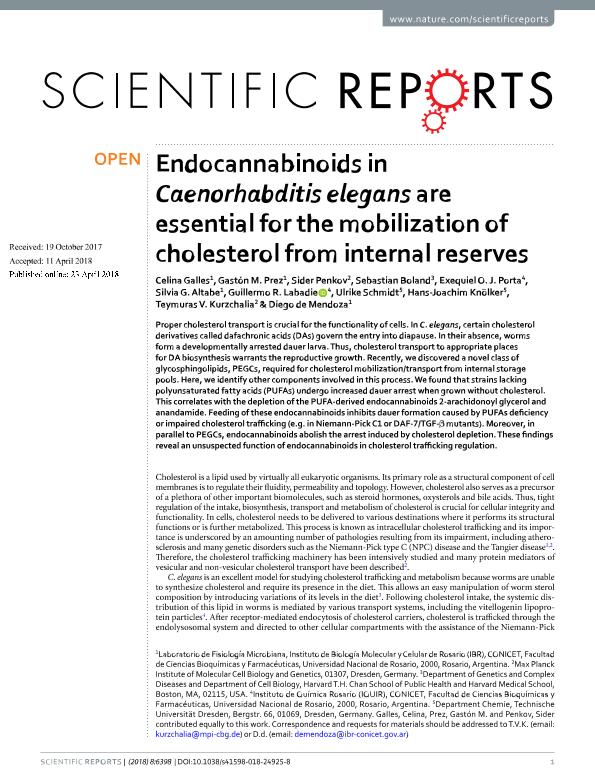Artículo
Endocannabinoids in Caenorhabditis elegans are essential for the mobilization of cholesterol from internal reserves
Galles, Celina ; Prez, Gastón Matías
; Prez, Gastón Matías ; Penkov, Sider; Boland, Sebastian; Porta, Exequiel Oscar Jesús
; Penkov, Sider; Boland, Sebastian; Porta, Exequiel Oscar Jesús ; Altabe, Silvia Graciela
; Altabe, Silvia Graciela ; Labadie, Guillermo Roberto
; Labadie, Guillermo Roberto ; Schmidt, Ulrike; Knölker, Hans Joachim; Kurzchalia, Teymuras V.; de Mendoza, Diego
; Schmidt, Ulrike; Knölker, Hans Joachim; Kurzchalia, Teymuras V.; de Mendoza, Diego
 ; Prez, Gastón Matías
; Prez, Gastón Matías ; Penkov, Sider; Boland, Sebastian; Porta, Exequiel Oscar Jesús
; Penkov, Sider; Boland, Sebastian; Porta, Exequiel Oscar Jesús ; Altabe, Silvia Graciela
; Altabe, Silvia Graciela ; Labadie, Guillermo Roberto
; Labadie, Guillermo Roberto ; Schmidt, Ulrike; Knölker, Hans Joachim; Kurzchalia, Teymuras V.; de Mendoza, Diego
; Schmidt, Ulrike; Knölker, Hans Joachim; Kurzchalia, Teymuras V.; de Mendoza, Diego
Fecha de publicación:
12/2018
Editorial:
Nature Publishing Group
Revista:
Scientific Reports
ISSN:
2045-2322
Idioma:
Inglés
Tipo de recurso:
Artículo publicado
Clasificación temática:
Resumen
Proper cholesterol transport is crucial for the functionality of cells. In C. elegans, certain cholesterol derivatives called dafachronic acids (DAs) govern the entry into diapause. In their absence, worms form a developmentally arrested dauer larva. Thus, cholesterol transport to appropriate places for DA biosynthesis warrants the reproductive growth. Recently, we discovered a novel class of glycosphingolipids, PEGCs, required for cholesterol mobilization/transport from internal storage pools. Here, we identify other components involved in this process. We found that strains lacking polyunsaturated fatty acids (PUFAs) undergo increased dauer arrest when grown without cholesterol. This correlates with the depletion of the PUFA-derived endocannabinoids 2-arachidonoyl glycerol and anandamide. Feeding of these endocannabinoids inhibits dauer formation caused by PUFAs deficiency or impaired cholesterol trafficking (e.g. in Niemann-Pick C1 or DAF-7/TGF-β mutants). Moreover, in parallel to PEGCs, endocannabinoids abolish the arrest induced by cholesterol depletion. These findings reveal an unsuspected function of endocannabinoids in cholesterol trafficking regulation.
Palabras clave:
ENDOCANNABONOIDS
,
CAENORHABDITIS ELEGANS
,
NEUROCHEMISTRY
,
CHOLESTEROL
Archivos asociados
Licencia
Identificadores
Colecciones
Articulos(IBR)
Articulos de INST.DE BIOLOGIA MOLECULAR Y CELULAR DE ROSARIO
Articulos de INST.DE BIOLOGIA MOLECULAR Y CELULAR DE ROSARIO
Citación
Galles, Celina; Prez, Gastón Matías; Penkov, Sider; Boland, Sebastian; Porta, Exequiel Oscar Jesús; et al.; Endocannabinoids in Caenorhabditis elegans are essential for the mobilization of cholesterol from internal reserves; Nature Publishing Group; Scientific Reports; 8; 1; 12-2018; 1-12
Compartir
Altmétricas



